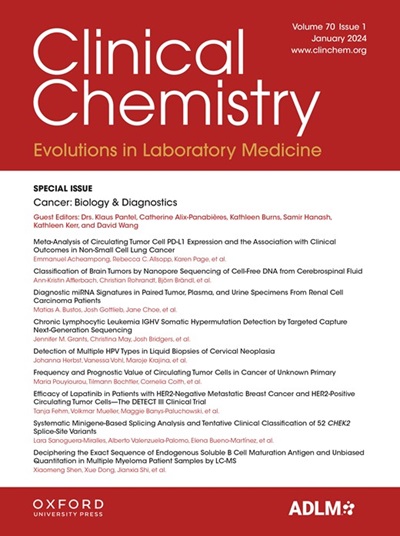Automated and Decentralized Genomic Profiling of Plasma Cell-Free DNA for Identification of Targetable and Resistance Alterations in Advanced Solid Tumors
IF 7.1
2区 医学
Q1 MEDICAL LABORATORY TECHNOLOGY
引用次数: 0
Abstract
Background Existing circulating cell-free DNA (cfDNA) assays are primarily centralized, requiring specialized sample handling and transportation. Implementing a flexible, decentralized sequencing system at point of care, with minimal technical oversight, can enhance turnaround times and patient access to genomic profiling. In this study, we aimed to evaluate the clinical feasibility of an automated and decentralized cfDNA next-generation sequencing (NGS) assay for identifying actionable alterations in advanced solid tumors. Methods Genomic profiling of plasma cfDNA from 298 patients with advanced solid tumors was conducted using an automated NGS assay. We assessed concordance of tumor mutations detected in plasma cfDNA and patient-matched tumor tissues analyzed by an FDA-approved assay, investigating clinical factors influencing circulating tumor DNA (ctDNA) aberration (mut-ctDNA) detection sensitivity. Results Sequencing success rates for cfDNA genomic profiling was significantly higher than archived tumor tissue (99% vs 96%). Mut-ctDNA detection rates ranged from 20% to 67% across different solid tumors. Targetable or resistance alterations were found in 18% of the patients. About 72% of the patients showed concordant alterations from tissue and plasma. The level of concordance was associated with the cancer type, tumor burden, and metastatic location. Notably, 63 plasma-only alterations were identified in 18% of patients and were more frequently observed in those with prior targeted treatments (24%) compared to chemotherapy (10%). Conclusions This study underscores the clinical feasibility of an automated, decentralized cfDNA genomic profiling approach. It emphasizes the importance of considering confounding clinical factors when selecting plasma- or tissue-based profiling assay. Such an approach holds promise for enhancing patient access to timely genomic profiling and targeted therapy selection.用于鉴定晚期实体瘤中靶向性和耐药性改变的无浆细胞DNA的自动化和分散基因组谱分析
现有的循环无细胞DNA (cfDNA)检测主要是集中的,需要专门的样品处理和运输。在医疗点实施灵活、分散的测序系统,减少技术监督,可以缩短周转时间,并缩短患者获得基因组图谱的机会。在这项研究中,我们旨在评估自动化和分散cfDNA下一代测序(NGS)测定在晚期实体瘤中识别可操作改变的临床可行性。方法采用自动NGS法对298例晚期实体瘤患者血浆cfDNA进行基因组分析。我们评估了血浆cfDNA中检测到的肿瘤突变与fda批准的检测方法分析的患者匹配肿瘤组织的一致性,研究了影响循环肿瘤DNA (ctDNA)畸变(mutt -ctDNA)检测灵敏度的临床因素。结果cfDNA基因组图谱测序成功率显著高于存档肿瘤组织(99% vs 96%)。Mut-ctDNA在不同实体肿瘤中的检出率从20%到67%不等。在18%的患者中发现了可靶向性或耐药性改变。约72%的患者表现出组织和血浆的一致性改变。一致性水平与癌症类型、肿瘤负荷和转移部位有关。值得注意的是,在18%的患者中发现了63种血浆改变,并且在先前接受靶向治疗的患者中(24%)比化疗(10%)更频繁地观察到。本研究强调了一种自动化的、分散的cfDNA基因组分析方法的临床可行性。它强调了在选择血浆或组织谱分析时考虑混杂临床因素的重要性。这种方法有望提高患者获得及时的基因组分析和靶向治疗选择。
本文章由计算机程序翻译,如有差异,请以英文原文为准。
求助全文
约1分钟内获得全文
求助全文
来源期刊

Clinical chemistry
医学-医学实验技术
CiteScore
11.30
自引率
4.30%
发文量
212
审稿时长
1.7 months
期刊介绍:
Clinical Chemistry is a peer-reviewed scientific journal that is the premier publication for the science and practice of clinical laboratory medicine. It was established in 1955 and is associated with the Association for Diagnostics & Laboratory Medicine (ADLM).
The journal focuses on laboratory diagnosis and management of patients, and has expanded to include other clinical laboratory disciplines such as genomics, hematology, microbiology, and toxicology. It also publishes articles relevant to clinical specialties including cardiology, endocrinology, gastroenterology, genetics, immunology, infectious diseases, maternal-fetal medicine, neurology, nutrition, oncology, and pediatrics.
In addition to original research, editorials, and reviews, Clinical Chemistry features recurring sections such as clinical case studies, perspectives, podcasts, and Q&A articles. It has the highest impact factor among journals of clinical chemistry, laboratory medicine, pathology, analytical chemistry, transfusion medicine, and clinical microbiology.
The journal is indexed in databases such as MEDLINE and Web of Science.
 求助内容:
求助内容: 应助结果提醒方式:
应助结果提醒方式:


